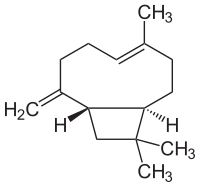
Photo from wikipedia
Simple Summary Basil (Ocimum basilicum) is a medicinal herb of the family Lamiaceae that contains a variety of potential bioactive compounds, such as polyphenols, flavonoids, phenolics, and essential oils. Ocimum… Click to show full abstract
Simple Summary Basil (Ocimum basilicum) is a medicinal herb of the family Lamiaceae that contains a variety of potential bioactive compounds, such as polyphenols, flavonoids, phenolics, and essential oils. Ocimum basilicum can boost phagocytic action of neutrophils and immunostimulant effect, antimicrobial activity due to linalool by having inhibitory action toward all tested microorganism, and additionally, rosmarinic acid shows inhibition in DNA synthesis, as well as protein synthesis when experimented on hepatoma-derived cell line (HepG2), this resulted by lower DNA fragments plus suppression on caspase-3 activation, which blocks apoptosis. The aim of this review is to spotlight and discuss the anti-cancer activity of basil (Ocimum) and its implications in cancer prevention and treatment. Antioxidants and other bioactive compounds in basil leaves show important potential anti-cancer activity regards to cell death and viability inhibition, cytotoxicity, inducing apoptosis, slowing down tumor growth and especially on cell cycle arrest both in vivo and in vitro. Abstract Background: Cancer is an irregular proliferation of cells that starts with a gene mutation that alters cellular function, is triggered by several factors, and can be inherited or acquired. The aim of this review is to discuss the anticancer activity of basil and its components’ strength, focusing on its implication in cancer prevention and treatment. Methods: This systematic review involves all of the studies published from 1 January 2010 through 1 January 2022. Results: In this review, 16 research articles are included to discuss the potential anticancer ability of the extracts of various Ocimum basilicum varieties at various dosages, applied to different cancer cells. Of those 16 articles, 2 were in vivo studies, 13 were in vitro studies, and 1 study conducted both in vivo and in vitro experiments. Antioxidants and other bioactive compounds in basil leaves show important potential anticancer activity at dosage of 4 mg/mL as aqueous extract or essential oil up to 200 µg/mL could slow-down tumor growth and progression with regards to cell death and viability inhibition. At dosages from 50 to 500 µg/mL is effective as anti-proliferative activities. cytotoxicity, inducing apoptosis, slowing down tumor growth, and especially cell cycle arrest, both in vivo and in vitro. Human studies show effects at dosages from 1 to 2.5 mg/daily on general vital activities and on reducing cytokines activity. Conclusions: Based on 16 published studies, basil demonstrates important anticancer activities in vivo and vitro models, and it could act as a potential cancer.
Journal Title: Cancers
Year Published: 2022
Link to full text (if available)
Share on Social Media: Sign Up to like & get
recommendations!